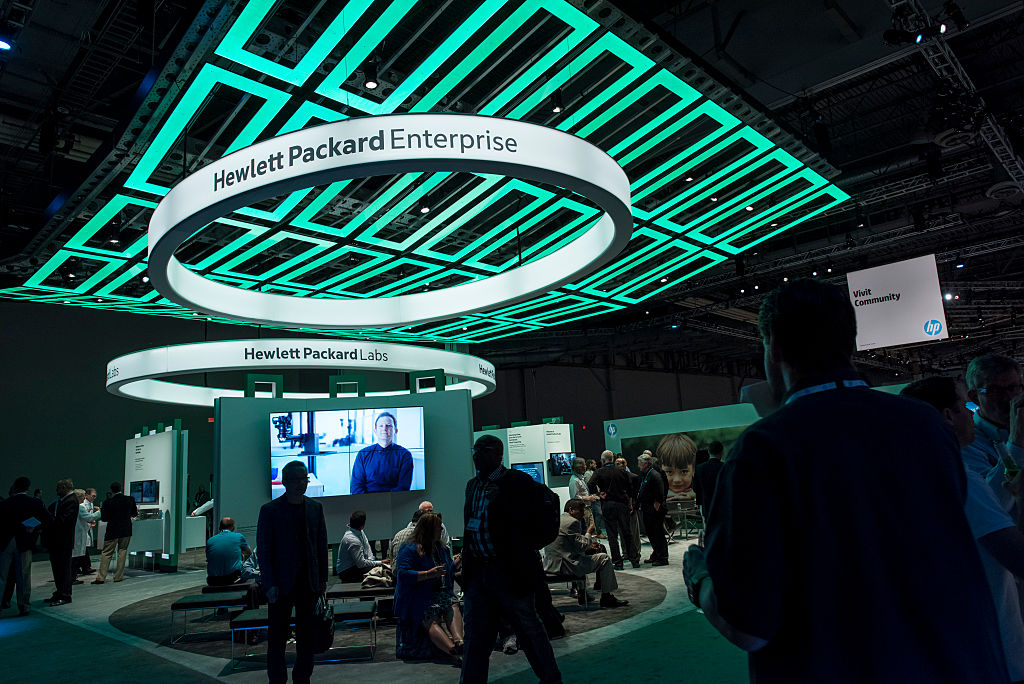The Big Tech Lobby Has the DOJ in a Stranglehold
A secret lobbying effort by Hewlett Packard Enterprise has pushed Donald Trump’s Justice Department to reverse course on the tech giant’s $14 billion megamerger and led to the ouster of top department prosecutors.

The Department of Justice approved a $14 billion tech megamerger pursued by Hewlett Packard Enterprise. (David Paul Morris / Bloomberg via Getty Images)
The Trump Justice Department is embroiled in a corporate coup attempt, exposing major rifts within the GOP coalition and a rampant culture of pay-to-play corruption. The graft reaches the highest levels of the agency, resulting in the ouster of top department prosecutors and threatening to undo a number of ongoing Joe Biden–era lawsuits against corporations like Apple, Visa, and Ticketmaster.
After a scorched-earth lobbying campaign, the Department of Justice walked back its own lawsuit blocking a $14 billion tech megamerger pursued by tech giant Hewlett Packard Enterprise (HPE) just weeks before the case was set to go to trial.
Instead, the Justice Department approved the deal with a weak consent decree — a legally binding order imposing some obligations on the combined firm to maintain market competition. In doing so, officials overruled their own antitrust division, whose initial complaint on the merger laid out a litany of anticompetitive concerns.
HPE and its acquisition target, Juniper Networks, are head-to-head competitors in the market of Wi-Fi systems that many businesses, large and small, rely on. According to the lawsuit, the merger will increase Wi-Fi costs, which will ultimately be passed on to consumers.
In the months following the initial January lawsuit, HPE ran an unorthodox lobbying campaign to influence the Trump administration by bankrolling a team of shadowy Trump-connected consultants and influence peddlers.
That included paying $1 million each to Arthur Schwartz, a confidant of Don Trump Jr and Vice President J. D. Vance, and MAGA antitrust whisperer Mike Davis, who celebrated the initial lawsuit (“3 into 2; you must sue,” was how he originally put it in a post on X) before getting hired by HPE to argue the opposite. HPE also paid a partner at the law firm Sidley Austin, Will Levi, who served as chief of staff to the US attorney general during Donald Trump’s first term.
This form of off-the-books lobbying, which circumvents many traditional lobbying disclosure requirements, has become an increasingly common way to influence the Trump administration.
HPE’s consultants appeared to find a sympathetic ear with Attorney General Pam Bondi’s chief of staff, Chad Mizelle, who is tied to the judicial puppet master Leonard Leo’s conservative legal network.
In an unusual move, Mizelle overruled antitrust chief Gail Slater and let the merger proceed. Then this week, he fired two of her top deputies who had disagreed with his move.
HPE’s lobbying gambit came to light because of a 1974 anti-corruption law called the Tunney Act, which was passed in the wake of the Nixon Watergate scandal — and which also involved a cash-for-antitrust-waiver arrangement for a tech-company merger. Thanks to the law, as part of antitrust consent decrees, companies are required to file legal services disclosures to ensure the government isn’t cutting crony backroom deals.
Such disclosures submitted last week in the HPE case, first reported by the Capitol Forum, revealed the tech company’s influence scheme. Because the dealings have now come to light, the consent decree could be rejected by a district court judge as a violation of the Tunney Act.
In a last-minute effort to save face, top Trump officials told Axios that intelligence authorities intervened to rubber-stamp the deal because of national security reasons. That claim never appeared in any of the Justice Department or HPE’s legal briefs.